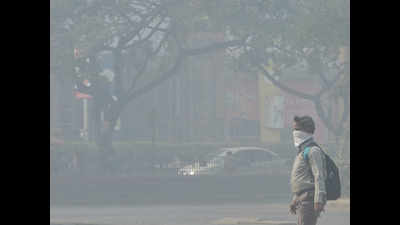- News
- City News
- mumbai News
- BMC, IITs, MPCB and NEERI brainstorm to check pollution
Trending
This story is from October 24, 2019
BMC, IITs, MPCB and NEERI brainstorm to check pollution
Taking lessons from a recent Bombay high court ruling that project-affected persons (PAP) cannot be shifted to Mahul, a “dangerously polluted region”, the BMC along with other agencies and institutes held a marathon meeting on Wednesday to identify sources of different kinds of pollution and steps to limit them.

Representative image
MUMBAI: Taking lessons from a recent Bombay high court ruling that project-affected persons (PAP) cannot be shifted to Mahul, a “dangerously polluted region”, the BMC along with other agencies and institutes held a marathon meeting on Wednesday to identify sources of different kinds of pollution and steps to limit them.

The agencies and institutes included Maharashtra Pollution Control Board, Indian Institutes of Technology (IIT), National Environmental Engineering Research Institute (NEERI) and Mumbai traffic police.
Track the pollution level in your city
A timeline was set to complete the various goals and circulated among those present at the meeting.
The BMC tabled a presentation charting out causes of air pollution in Mumbai, including unauthorised trash burning, suspension of dust during mechanical sweeping of roads and particulate matter while transporting construction debris.
Causes of noise pollution such as honking and use of machinery in public areas were discussed too.
Each agency and stakeholder was given the responsibility to tackle a particular pollution source and a specific timeframe to implement required measures.
A senior civic official said, “As all the agencies were present at the meeting, we got suggestions on the ways in which pollution can be reduced in the city. For instance, we have decided to have a policy to ensure no repeated trenching takes place on roads and footpaths. The commissioner asked the roads department to frame a policy in three months. It was also decided that emission control would be a must for hotels and industries with use of cleaner technology. MPCB and hotel associations will work in the direction.”
All civic departments and agencies must give monthly updates on the steps taken.

The agencies and institutes included Maharashtra Pollution Control Board, Indian Institutes of Technology (IIT), National Environmental Engineering Research Institute (NEERI) and Mumbai traffic police.
Track the pollution level in your city
The meeting also had representatives from oil companies and hotel industries.
A timeline was set to complete the various goals and circulated among those present at the meeting.
The BMC tabled a presentation charting out causes of air pollution in Mumbai, including unauthorised trash burning, suspension of dust during mechanical sweeping of roads and particulate matter while transporting construction debris.
Causes of noise pollution such as honking and use of machinery in public areas were discussed too.
Each agency and stakeholder was given the responsibility to tackle a particular pollution source and a specific timeframe to implement required measures.
A senior civic official said, “As all the agencies were present at the meeting, we got suggestions on the ways in which pollution can be reduced in the city. For instance, we have decided to have a policy to ensure no repeated trenching takes place on roads and footpaths. The commissioner asked the roads department to frame a policy in three months. It was also decided that emission control would be a must for hotels and industries with use of cleaner technology. MPCB and hotel associations will work in the direction.”
All civic departments and agencies must give monthly updates on the steps taken.
End of Article
FOLLOW US ON SOCIAL MEDIA










